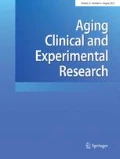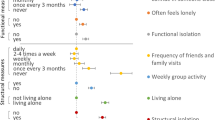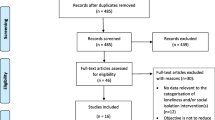Abstract
Background and aims: In clinical practice, the status of living alone is often used as the only measure describing an older person’s social network. We evaluated whether additional use of a brief social network measure provides relevant additional information in relation to social support and engagement. Methods: Cross-sectional survey of 6982 community-dwelling adults 65 years or older living in London, UK; Hamburg, Germany; and Solothurn, Switzerland. Data were collected using the self-administered multidimensional Health Risk Appraisal Questionnaire. Multivariate models were used to analyse adjusted correlations between the two measures of social network (living alone status, risk for social isolation with marginal family and friend network subscales) and potential consequences of inadequate social network (marginal emotional or instrumental support, lack of social engagement). Results: Living alone status was more strongly associated with marginal instrumental support [OR=7.6 (95% CI 6.3, 9.1)] than with marginal emotional support [OR=4.2 (95% CI 3.4, 5.1)], and showed no statistically significant association with lack of social engagement [OR=0.9 (95% CI 0.8, 1.0)]. Risk of social isolation was more strongly related to marginal emotional support [OR=6.6 (95% CI 5.4, 8.0)] than to marginal instrumental support [OR=3.3 (95% CI 2.8, 4.0)], and was moderately related to lack of social engagement [OR=2.9 (95% CI 2.5, 3.4]. Marginal family and friend network subscales showed consistent and unique associations with social support and social engagement. Conclusion: Findings suggest that living alone status and a brief measure of social network identifies distinctive at-risk groups and potential pathways for intervention. Geriatric assessment programs including both social network measures may provide useful information about potentially modifiable social network risks in older persons.
Similar content being viewed by others
References
Lubben J, Gironda M. Social support networks. In Osterweil D, Brummel-Smith K, Beck JC, eds. Comprehensive Geriatric Assessment. New York: McGraw Hill, 2000: 121–37.
Berkman LF, Glass T, Brissette I et al. From social integration to health: Durkheim in the new millennium. Soc Sci Med 2000; 51: 843–57.
Melchior M, Berkman LF, Niedhammer I et al. Social relations and self-reported health: a prospective analysis of the French Gazel cohort. Soc Sci Med 2003; 56: 1817–30.
Berkman L, Glass TA. Social integration, social networks, social supports and health. In Berkman LF, Glass TA, eds. Social Epidemiology. New York: Oxford Press, 2000: 137–73.
Bisschop MI, Kriegsman DM, van Tilburg TG et al. The influence of differing social ties on decline in physical functioning among older people with and without chronic diseases: the Longitudinal Aging Study Amsterdam. Aging Clin Exp Res 2003; 15: 164–73.
Psychological and social issues, American Geriatrics Society (New York, NY), 2005. (http://www.healthinaging.org/agingintheknow/chapters_ch_trial.asp?ch=3#Social%0involveme nt).
Keller BK, Magnuson TM, Cernin PA et al. The significance of social network in a geriatric assessment population. Aging Clin Exp Res 2003; 15: 512–7.
Guilley E, Pin S, Spini D et al. Association between social relationships and survival of Swiss octogenarians. A five-year prospective, population-based study. Aging Clin Exp Res 2005; 17: 419–25.
Iliffe S, Kharicha K, Harari D et al. Health risk appraisal in older people 2: the implications for clinicians and commissioners of social isolation risk in older people. Br J Gen Pract 2007; 57: 277–82.
Kharicha K, Iliffe S, Harari D et al. Health risk appraisal in older people 1: are older people living alone an “at-risk” group? Br J Gen Pract 2007; 57: 271–6.
Seeman TE. Social ties and health: the benefits of social integration. Ann Epidemiol 1996; 6: 442–51.
Stuck AE, Walthert JM, Nikolaus T et al. Risk factors for functional status decline in community-living elderly people: a systematic literature review. Soc Sci Med 1999; 48: 445–69.
Ferrucci L, Guralnik JM, Studenski S et al. Designing randomized, controlled trials aimed at preventing or delaying functional decline and disability in frail, older persons: a consensus report. J Am Geriatr Soc 2004; 52: 625–34.
Rubenstein LZ, Shekelle P, Tucker J et al. Health risk appraisals and Medicare. Baltimore: U.S. Department of Health and Human Services, Health Care Financing Administration, 2003.
Lubben J, Blozik E, Gillmann G et al. Performance of an abbreviated version of the Lubben Social Network Scale among three European community-dwelling older adult populations. Gerontologist 2006; 46: 503–13.
Ell K. Social networks, social support and coping with serious illness: the family connection. Soc Sci Med 1996; 42: 173–83.
Stuck AE, Kharicha K, Dapp U et al. The PRO-AGE study: an international randomised controlled study of health risk appraisal for older persons based in general practice. BMC Med Res Methodol 2007; 7: 2.
Stuck AE, Elkuch P, Dapp U et al. Feasibility and yield of a self-administered questionnaire for health risk appraisal in older people in three European countries. Age Ageing 2002; 31: 463–7.
Stuck AE, Kharicha K, Dapp U et al. Development, feasibility and performance of a health risk appraisal questionnaire for older persons. BMC Med Res Methodol 2007; 7: 1.
Lubben JE. Assessing social networks among elderly populations. Fam Community Health 1988; 11: 42–52.
Lawton MP, Brody EM. Assessment of older people: self-maintaining and instrumental activities of daily living. Gerontologist 1969; 9: 179–86.
Breslow L, Beck JC, Morgenstern H et al. Development of a health risk appraisal for the elderly (HRA-E). Am J Health Promot 1997; 11: 337–43.
Stewart AL, Hays RD, Ware JE Jr. The MOS short-form general health survey. Reliability and validity in a patient population. Med Care 1988; 26: 724–35.
Friedman B, Heisel M, Delavan R. Validity of the SF-36 five-item Mental Health Index for major depression in functionally impaired, community-dwelling elderly patients. J Am Geriatr Soc 2005; 53: 1978–85.
Sherbourne CD, Stewart AL. The MOS social support survey. Soc Sci Med 1991; 32: 705–14.
Boult C, Dowd B, McCaffrey D et al. Screening elders for risk of hospital admission. J Am Geriatr Soc 1993; 41: 811–7.
Lubben J, Gironda M. Centrality of social ties to the health and well-being of older adults. In Berkman B, Harootyan U, eds. Social Work and Health Care in an Aging Society: Education, Practice, and Research. New York: Springer, 2003: 319–50.
Zunzunegui MV, Alvarado BE, Del Ser T et al. Social networks, social integration, and social engagement determine cognitive decline in community-dwelling Spanish older adults. J Gerontol B Psychol Sci Soc Sci 2003; 58: S93–100.
Kirkwood BR, Sterne JAC. Essential Medical Statistics. Blackwell Publishing, 1988. Philadelphia, PA: Lippincott-Raven, 1998: 401–34.
Greenland S. Chapter 21: introduction to regression modeling. In Rothman KG, Greenland S, eds. Modern Epidemiology. Philadelphia, PA: Lippincott-Raven, 1998: 401–34.
Seeman TE, Berkman LF, Kohout F et al. Intercommunity variations in the association between social ties and mortality in the elderly. A comparative analysis of three communities. Ann Epidemiol 1993; 3: 325–35.
Zaidi A. Poverty of elderly people EU25. Vienna: European Centre for Social Welfare Policy and Research, 2006.
Schoenenberger AW, Stuck AE. Health care for older persons in Switzerland: a country profile. J Am Geriatr Soc 2006; 54: 986–90.
Personen ohne primäres soziales Netzwerk nach soziodemografischen Merkmalen 2003: Übersichtstabelle zum Herunterladen. Swiss Federal Statistical Office, 2006.
Hsu JC. Multiple Comparisons: Theory and Methods. London, UK: Chapman & Hall, 1996.
Author information
Authors and Affiliations
Corresponding author
Rights and permissions
About this article
Cite this article
Blozik, E., Wagner, J.T., Gillmann, G. et al. Social network assessment in community-dwelling older persons: results from a study of three European populations. Aging Clin Exp Res 21, 150–157 (2009). https://doi.org/10.1007/BF03325223
Received:
Accepted:
Published:
Issue Date:
DOI: https://doi.org/10.1007/BF03325223




